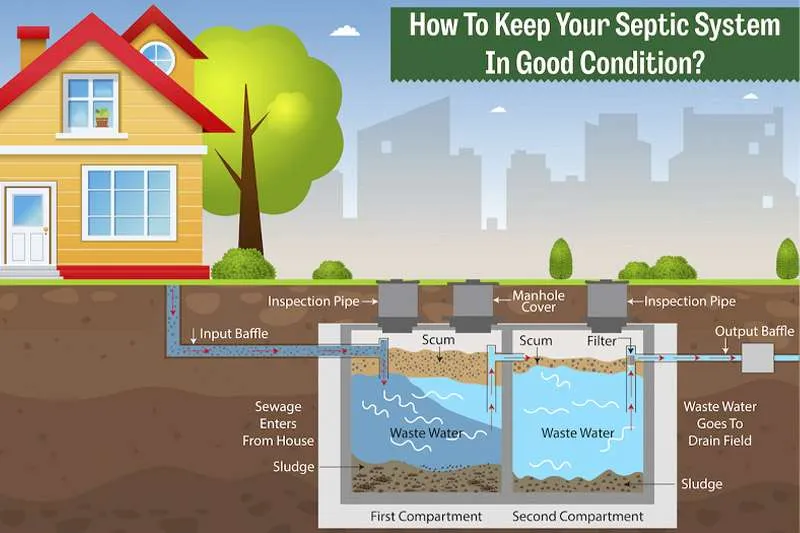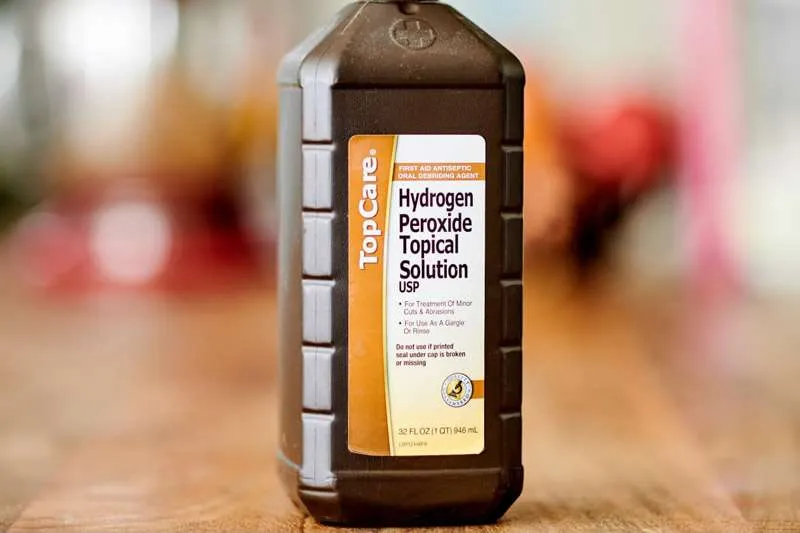Septic systems are a crucial aspect of waste management in many homes that are not connected to municipal sewer systems. One question that often arises when discussing septic tank maintenance is hydrogen peroxide safe for septic tanks. In this article, we will explore the properties of hydrogen peroxide, determine if it is safe for septic systems, and provide alternatives for septic tank cleaning.
Understanding The Properties Of Hydrogen Peroxide
Hydrogen peroxide (H2O2) is a chemical compound consisting of two hydrogen atoms and two oxygen atoms. It is a pale blue liquid that appears colorless in a dilute solution and is commonly used as a disinfectant and bleach. Hydrogen peroxide is an oxidizing agent, which means it has the ability to gain electrons from other substances, making it effective at killing bacteria, viruses, and other microorganisms. This property also makes it a popular cleaning agent in various industries and households.
Is Hydrogen Peroxide Safe for Septic Systems?
When it comes to the safety of hydrogen peroxide for septic tanks, the answer is complex. While hydrogen peroxide can be effective in killing harmful bacteria, it can also be detrimental to the beneficial bacteria that reside in septic systems. These beneficial bacteria are responsible for breaking down solid waste materials into a more manageable form, ensuring that the septic system functions efficiently.
Using hydrogen peroxide in small amounts and in low concentrations may not have a significant negative impact on the septic system. However, consistently using large quantities of hydrogen peroxide or using it in high concentrations can disrupt the balance of beneficial bacteria in the septic tank. This disruption can lead to a decrease in the system’s overall efficiency and, in some cases, may cause the septic tank to become clogged or backed up.
So, is hydrogen peroxide safe for septic tanks? In moderation and at low concentrations, it can be used without causing significant harm. However, regular use and high concentrations can lead to problems in the long run.
Why Do You Need to Clean Septic Systems?
Regular maintenance and cleaning of septic systems are essential to ensure their proper functioning and longevity. Over time, solid waste accumulates in the septic tank, and if left unattended, it can lead to clogs, unpleasant odors, and even system failure. Cleaning a septic system involves removing sludge buildup and ensuring that the system remains free of obstructions.
Additionally, maintaining the balance of beneficial bacteria in the septic tank is crucial for efficient waste breakdown. These bacteria thrive in an oxygen-rich environment, so it is essential to avoid introducing harmful chemicals that could disrupt the balance of the bacterial ecosystem.
What Is the Best Cleaning Agent for Septic Systems?
While hydrogen peroxide has its uses, there are safer and more effective alternatives for cleaning septic systems. Some of the best cleaning agents for septic systems include:
Enzymatic cleaners: These cleaners contain enzymes and bacteria that are specifically designed to break down organic waste materials in septic systems. They are eco-friendly and help maintain the balance of beneficial bacteria in the septic tank.
Biodegradable cleaning agents: Biodegradable cleaners break down naturally and do not harm the environment or the septic system. They are an excellent option for cleaning septic tanks, as they do not disrupt the bacterial balance.
Regular septic tank pumping: One of the most effective ways to maintain a septic system is to schedule regular septic tank pumping. This process involves removing sludge and scum buildup from the tank and ensuring that the system remains free of obstructions. It is generally recommended to pump your septic tank every 3-5 years, depending
Using Hydrogen Peroxide for Septic Systems
Hydrogen peroxide can be used in septic systems, but it is essential to exercise caution. Using hydrogen peroxide in small amounts and in low concentrations may not have a significant negative impact on the septic system. However, consistently using large quantities of hydrogen peroxide or using it in high concentrations can disrupt the balance of beneficial bacteria in the septic tank. This disruption can lead to a decrease in the system’s overall efficiency and, in some cases, may cause the septic tank to become clogged or backed up.
How Often Do You Need to Clean Your Septic Systems?
The frequency of cleaning your septic system depends on factors such as the size of the tank, the number of people in the household, and the amount of wastewater generated. Generally, it is recommended to pump your septic tank every 3-5 years to remove sludge and scum buildup. Additionally, you should inspect the system annually to ensure proper functioning and address any issues early.
What else should someone know about cleaning their septic system?
When cleaning your septic system, it is crucial to avoid using harsh chemicals that can harm beneficial bacteria and disrupt the system’s balance. Opt for eco-friendly and biodegradable cleaning agents, and consider using enzyme-based cleaners specifically designed for septic systems. Regular maintenance, including annual inspections and scheduled pumping, will help keep your septic system in optimal condition.
Why Is Hydrogen Peroxide Perfect for Septic Systems?
Hydrogen peroxide is not perfect for septic systems, but it has some advantages. It is an effective disinfectant and oxidizing agent, which makes it useful for killing harmful bacteria and viruses. However, it is essential to use hydrogen peroxide in moderation and at low concentrations to minimize the risk of disrupting the balance of beneficial bacteria in the septic tank.
Are there other cleaners that are better for your septic system?
Yes, there are alternative cleaners that are better suited for septic systems, such as:
Enzymatic cleaners: These cleaners contain enzymes and bacteria specifically designed to break down organic waste materials in septic systems. They are eco-friendly and help maintain the balance of beneficial bacteria in the septic tank.
Biodegradable cleaning agents: Biodegradable cleaners break down naturally and do not harm the environment or the septic system. They are an excellent option for cleaning septic tanks, as they do not disrupt the bacterial balance.
What Hydrogen Peroxide Concentration Is Ideal for Septic Systems?
If you choose to use hydrogen peroxide for your septic system, it is best to use a low concentration of 3% or less. This concentration level minimizes the risk of disrupting the beneficial bacteria in the tank while still providing some disinfecting properties.
A simple recipe for using hydrogen peroxide in your septic system is as follows:
- Mix one cup of 3% hydrogen peroxide with one gallon of water.
- Pour the solution into your toilet and flush it into the septic system.
- Use this solution once every 2-3 months to maintain the cleanliness and efficiency of your septic system.
Remember, it is crucial to use hydrogen peroxide in moderation and at low concentrations to avoid disrupting the balance of beneficial bacteria in your septic tank. Additionally, this recipe should not replace regular septic system maintenance, such as annual inspections and scheduled pumping.
Hydrogen peroxide can be used in septic systems, but caution must be exercised to prevent any negative impact on the beneficial bacteria present in the tank. Utilizing low concentrations of hydrogen peroxide and using it sparingly can provide some benefits, such as disinfection, without causing significant harm to the septic system.
However, it is essential to consider alternative cleaning agents, such as enzymatic cleaners and biodegradable cleaning agents, which are specifically designed for septic systems and pose less risk to the bacterial balance. Regular maintenance, including annual inspections and scheduled pumping, is the key to keeping your septic system functioning efficiently and prolonging its lifespan.
The Role of beneficial bacteria in septic systems
Beneficial bacteria play a crucial role in the proper functioning of septic systems. They are responsible for breaking down waste materials, converting solids into liquids, and reducing the volume of sludge and scum in the tank. A healthy population of beneficial bacteria ensures that the septic system can efficiently process waste, preventing clogs and system failures. Maintaining a balance of these bacteria is essential for optimal septic system performance, which is why it is vital to avoid using cleaning agents, such as hydrogen peroxide, that may disrupt this delicate balance.
Risks of using harsh chemicals in septic systems
Using harsh chemicals in septic systems can have negative consequences on the overall efficiency and lifespan of the system. Strong chemicals can kill the beneficial bacteria responsible for breaking down waste materials, leading to an accumulation of solids and potential clogs. They may also cause damage to the septic tank and other system components, resulting in costly repairs or even system failure. It is essential to choose cleaning agents that are gentle on the septic system and maintain the balance of beneficial bacteria to prevent these issues.
Hydrogen peroxide in household cleaning
Hydrogen peroxide is a versatile cleaning agent used in various household applications, including laundry, surface cleaning, and disinfection. While it is effective in killing harmful bacteria and viruses, its use in other areas of the home can inadvertently affect septic systems when the cleaning solution is washed down the drain. Using hydrogen peroxide in moderation and at low concentrations can minimize its impact on the septic system. However, it is crucial to be mindful of its overall usage to prevent potential harm to the septic system’s beneficial bacteria.
Environmental impact of septic system cleaning agents
The choice of cleaning agents for septic systems can have significant environmental implications. Harsh chemicals and non-biodegradable cleaning agents can contaminate groundwater, harm aquatic life, and disrupt ecosystems. Choosing eco-friendly and biodegradable cleaning agents, such as enzymatic cleaners, not only helps maintain a healthy septic system but also minimizes environmental impact. These cleaning agents break down naturally, pose no harm to the environment, and ensure the septic system remains sustainable.
Signs of septic system problems and the role of cleaning agents
Common signs of septic system problems include slow drains, foul odors, sewage backups, and pooling water in the drain field. The choice of cleaning agents can contribute to these issues by disrupting the balance of beneficial bacteria or causing damage to the septic tank and other components.
Using appropriate cleaning agents, such as biodegradable or enzyme-based cleaners, can help prevent these problems by maintaining a healthy bacterial balance and ensuring the septic system functions efficiently.

Proper septic system maintenance practices
Maintaining a healthy septic system involves regular inspections, scheduled pumping, and the use of appropriate cleaning agents. Annual inspections can help identify potential issues early, while pumping the septic tank every 3-5 years removes accumulated sludge and scum.
When choosing cleaning agents, opt for eco-friendly and biodegradable options or enzyme-based cleaners specifically designed for septic systems. These practices help prolong the septic system’s lifespan, maintain its efficiency, and prevent costly repairs or system failures.


